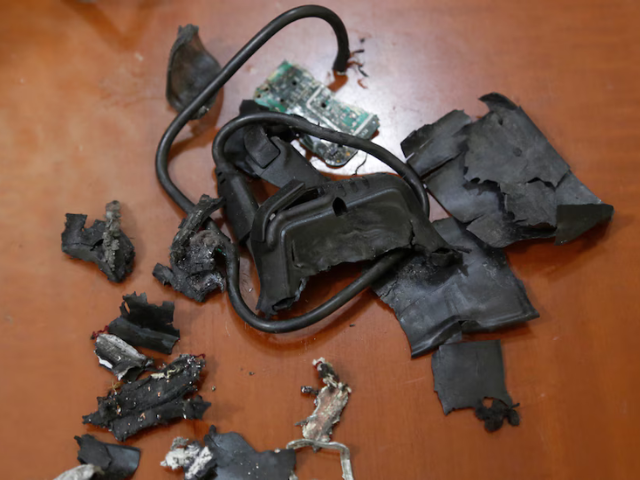A report by The Washington Post has revealed how Israel’s intelligence agency, Mossad, orchestrated a covert operation to turn pagers used by Hezbollah into explosive devices.
According to the report, Mossad engineered explosive devices within pagers that were used by Hezbollah commanders and fighters.
The devices exploded across various regions of Lebanon, causing the deaths and injuries of more than 3,000 Hezbollah members.
The fighters had no idea the communication tools they trusted were, in fact, rigged bombs.
In 2022, as Hezbollah sought reliable communication devices, the Israeli agency introduced Apollo pagers, rugged, waterproof, and seemingly ideal for battlefield conditions.
Hezbollah purchased 5,000 of these devices, believing they would enhance their operational security.
However, unbeknownst to them, these pagers contained a concealed explosive, designed to detonate when held with both hands, maximising casualties.
Mossad ensured that the pagers detonated remotely, with Israeli officials reporting the planned explosions occurred on September 17.
The successful execution of this operation marks one of the most ingenious penetrations of an enemy by an intelligence service in recent history.
However, it has raised concerns within Israel about the broader ramifications of such an aggressive strategy, especially regarding the potential escalation of conflict in the region.
The attack not only devastated Hezbollah’s leadership ranks but also emboldened Israel to target and kill Hezbollah’s top leader, Hasan Nasrallah, raising the risk of a wider Middle East war.
Iran retaliated by launching around 180 missiles against Israel, warning of severe consequences should the conflict escalate further.
The operation was years in the making, beginning with the idea of creating a communications “Trojan horse.”
As Israeli intelligence sought to penetrate Hezbollah’s operations, they first infiltrated the group by inserting booby-trapped walkie-talkies into Lebanon, allowing them to monitor communications for nearly a decade.
The pagers were marketed to Hezbollah by a woman who previously represented the Taiwanese company that manufactured them, but she was unaware of the covert operation.
These devices were assembled in Israel, with Mossad ensuring that each pager included a concealed explosive and a two-step decryption procedure that forced users to hold the devices with both hands.
In the ensuing explosion, users would likely sustain severe injuries, rendering them incapable of fighting back.
This operation involved the use of Apollo pagers, which are typically used in combat zones due to their durability and long battery life.
The report also highlighted that Hezbollah, wary of sabotage, had avoided procuring equipment from the U.S. or Israel, instead importing the pagers from Taiwan.
In a twist, it was revealed that an Indian national was involved in acquiring the modified pagers.
He has since fled Belgium, where he was last known to reside.
Pager explosions in Lebanon kill 8, injure over 2,750 as Hezbollah vows revenge
Last month, at least eight people were killed, and 2,750 others, including Hezbollah fighters, medics, and Iran’s envoy to Beirut, were wounded on Tuesday when the pagers they used to communicate exploded across Lebanon, according to security sources and the Lebanese health minister.
Lebanese Information Minister Ziad Makary condemned the detonation of the pagers as an “Israeli aggression.”
Hezbollah declared that Israel would receive “its fair punishment” for the blasts. A Hezbollah official, speaking on condition of anonymity, described the detonation as the “biggest security breach” the group had faced in nearly a year of conflict with Israel.
Among the deceased was the son of a Hezbollah member of the Lebanese parliament, which heightened the incident’s profile.
Iran’s ambassador to Lebanon, Mojtaba Amani, also suffered a minor injury from a pager explosion, with Iranian media reporting that he was under observation in a hospital.
The pagers that detonated were the latest model brought in by Hezbollah in recent months, with authorities suspecting they may have been tampered with prior to distribution.
The explosions, which occurred at around 3:30 p.m., caused chaos as people shopping, dining, or driving experienced their pagers overheating before detonating, primarily affecting areas with a strong Hezbollah presence.
Gold Apollo says deadly pagers in Lebanon were made in Budapest
Taiwan’s Gold Apollo revealed that while its brand was authorised for the pagers involved in recent explosions in Lebanon and Syria, the actual manufacturing was done by a Budapest-based firm.
The AR-924 pagers, which detonated almost simultaneously in Lebanon and Syria, resulted in at least nine deaths, including an 8-year-old girl, and injured over 2,000 people.
Hezbollah and Lebanese authorities accused Israel of orchestrating a sophisticated remote attack.
Gold Apollo stated that its agreement allowed BAC Consulting KFT in Budapest to use their trademark for specific regions, while the design and production were entirely the responsibility of the Budapest-based firm.
The explosions caused chaos in areas with a significant Hezbollah presence, including a southern suburb of Beirut and the Beqaa region in eastern Lebanon, as well as in Damascus.
The pagers were described as “rugged” and featured a rechargeable lithium battery, with up to 85 days of battery life, making them a preferred choice in Lebanon, where power outages were frequent.
Following the incident, Gold Apollo’s website was taken down, reflecting the fallout from the explosions and raising questions about the company’s accountability in the situation.







